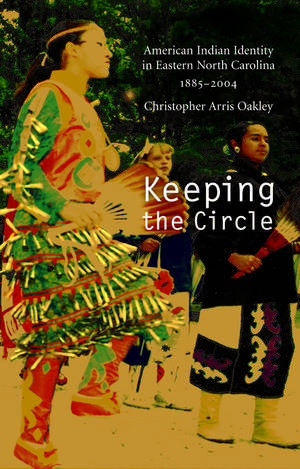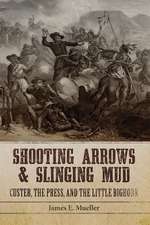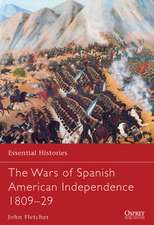Keeping the Circle: American Indian Identity in Eastern North Carolina, 1885-2004: Indians of the Southeast
Autor Christopher Arris Oakleyen Limba Engleză Paperback – 31 aug 2007
Keeping the Circle presents an overview of the modern history and identity of the Native peoples in twentieth-century North Carolina, including the Lumbees, the Tuscaroras, the Waccamaw Sioux, the Occaneechis, the Meherrins, the Haliwa-Saponis, and the Coharies. From the late 1800s until the 1930s, Native peoples in the eastern part of the state lived and farmed in small isolated communities. Although relatively insulated, they were acculturated, and few fit the traditional stereotype of an Indian. They spoke English, practiced Christianity, and in general lived and worked like other North Carolinians. Nonetheless, Indians in the state maintained a strong sense of “Indianness.”
The political, social, and economic changes effected by the New Deal and World War II forced Native Americans in eastern North Carolina to alter their definition of Indianness. The paths for gaining recognition of their Native identity in recent decades have varied: for some, identity has been achieved and expressed on a local stage; for others, sense of self is linked inextricably to national issues and concerns. Using a combination of oral history and archival research, Christopher Arris Oakley traces the strategic response of these Native groups in North Carolina to postwar society and draws broader conclusions about Native American identity in the late twentieth and early twenty-first century.
Din seria Indians of the Southeast
-
 Preț: 217.90 lei
Preț: 217.90 lei -
 Preț: 212.73 lei
Preț: 212.73 lei -
 Preț: 406.96 lei
Preț: 406.96 lei -
 Preț: 305.55 lei
Preț: 305.55 lei - 18%
 Preț: 763.91 lei
Preț: 763.91 lei -
 Preț: 102.69 lei
Preț: 102.69 lei -
 Preț: 255.82 lei
Preț: 255.82 lei -
 Preț: 124.75 lei
Preț: 124.75 lei - 18%
 Preț: 900.84 lei
Preț: 900.84 lei -
 Preț: 117.53 lei
Preț: 117.53 lei -
 Preț: 139.81 lei
Preț: 139.81 lei - 27%
 Preț: 1448.10 lei
Preț: 1448.10 lei -
 Preț: 93.81 lei
Preț: 93.81 lei -
 Preț: 107.63 lei
Preț: 107.63 lei -
 Preț: 157.52 lei
Preț: 157.52 lei -
 Preț: 139.40 lei
Preț: 139.40 lei -
 Preț: 155.88 lei
Preț: 155.88 lei -
 Preț: 292.23 lei
Preț: 292.23 lei -
 Preț: 423.91 lei
Preț: 423.91 lei -
 Preț: 230.59 lei
Preț: 230.59 lei -
 Preț: 185.46 lei
Preț: 185.46 lei -
 Preț: 259.59 lei
Preț: 259.59 lei -
 Preț: 425.05 lei
Preț: 425.05 lei -
 Preț: 209.42 lei
Preț: 209.42 lei -
 Preț: 136.72 lei
Preț: 136.72 lei -
 Preț: 148.09 lei
Preț: 148.09 lei -
 Preț: 188.30 lei
Preț: 188.30 lei -
 Preț: 190.51 lei
Preț: 190.51 lei -
 Preț: 291.08 lei
Preț: 291.08 lei - 23%
 Preț: 515.71 lei
Preț: 515.71 lei - 23%
 Preț: 397.89 lei
Preț: 397.89 lei
Preț: 107.63 lei
Nou
Puncte Express: 161
Preț estimativ în valută:
20.59€ • 21.50$ • 17.04£
20.59€ • 21.50$ • 17.04£
Carte disponibilă
Livrare economică 15-29 martie
Preluare comenzi: 021 569.72.76
Specificații
ISBN-13: 9780803222533
ISBN-10: 080322253X
Pagini: 196
Ilustrații: Illustrations, maps
Dimensiuni: 152 x 229 x 15 mm
Greutate: 0.29 kg
Ediția:New.
Editura: Nebraska Paperback
Colecția University of Nebraska Press
Seria Indians of the Southeast
Locul publicării:United States
ISBN-10: 080322253X
Pagini: 196
Ilustrații: Illustrations, maps
Dimensiuni: 152 x 229 x 15 mm
Greutate: 0.29 kg
Ediția:New.
Editura: Nebraska Paperback
Colecția University of Nebraska Press
Seria Indians of the Southeast
Locul publicării:United States
Notă biografică
Christopher Arris Oakley is an assistant professor of history at East Carolina University.
Recenzii
“Well written, informative, and important. Part of the University of Nebraska Press’s fine series on ‘Indians of the Southeast’ . . . . Such work has been neglected in larger studies of southern race relations, just as Native Americans have been neglected in narratives of twentieth-century American history.”—American Historical Review
“Oakley’s bonus is a lucid, eloquent discussion of how federal policies and changes in US culture affected the course of Indian history, particularly in North Carolina.”—G. Gagnon, Choice
“Everyone interested in southern or Native American history should pick up this eminently readable book. . . . The book’s accessible prose and straightforward organization make it ideal for use in undergraduate courses. . . . By telling the story of Indians in postbellum North Carolina, Keeping the Circle represents an important step toward a more inclusive narrative of Southern history. Helpfully, Oakley concludes his book with a bibliographic essay for those who wish to further develop this rich, but often ignored, aspect of the region’s past.”—H-Net Book Reviews, H-North Carolina









